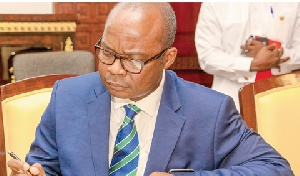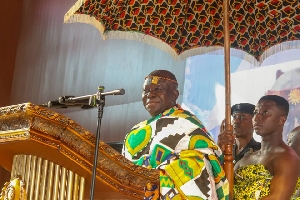Business News of Thursday, 22 June 2017
Source: thefinderonline.com
Governmentt borrows GH¢1.1 bn in Treasury Bills
The Bank of Ghana (BoG) will tomorrow Friday June 23, 2017 auction GH¢1.10 billion worth of short-term treasury securities.
The Bank is therefore requesting investors to submit their bids by 13:00 GMT tomorrow.
Analysts are hopeful that majority of the amount to be raised will come from the popular 91-day bill.
The difference of the yield between the 91-day and 182-day is a little above 1.0 percent, hence most investors interest for the 91-day.
Last Friday, the yield on the Bank’s weekly 91-day bill rose to 12.0964 percent at an auction, from 11.9077 percent at the last sale on June 9, 2017. The regulator said it had accepted GH¢586 million ($132.88 million) worth of bids out of the GH¢635.76 million tendered for the 91-day paper, which will be issued on June 19.
There are expectations that interest on treasury securities are expected to remain low this year, compelling commercial banks to increase its lending activities.
So far, government has reduced its browning in the short term securities the 91-day.
The reduction in the short term security which is one of the benchmark in determining lending rates indicates a further drop in Bank of Ghana’s policy rate in the coming months.
Already, inflation is hovering at a low of 12.6 percent (May 2017), a situation the Central Bank describes as significant in its quest to achieve its target of 8+/- 2 for 2017.
Presently, the government is profiling all debts to reduce the pressure of paying higher interest rates. Debt re-profiling is a form of financial restructuring where more expensive debts are replaced with less expensive ones. In some cases, short-term debts are replaced with long-term ones, ostensibly to reduce the public debt stock.
Cost of borrowing has also been declining as most banks have adjusted their base rates down. In additionally, the banks have been disbursing more loans compared to 2016.
Money supply has also been loosened slightly, making more funds available for the banks to lend instead of investments in short term securities.
The Bank of Ghana slashed its base lending rate-the policy rate by 100 basis points to 22.5 percent last month. This follows a 200 basis points reduction in March 2017. It attributed the decision largely to lower inflation.
According to the May 31, 2017 APR, the banking industry average base rate was 26.6 per cent, a marginal drop of 0.2 per cent, compared to 26.8 per cent at the end of April. At the beginning of the year, the industry average base rate was 27.6 per cent, giving a year-to-date drop of 1 per cent.











